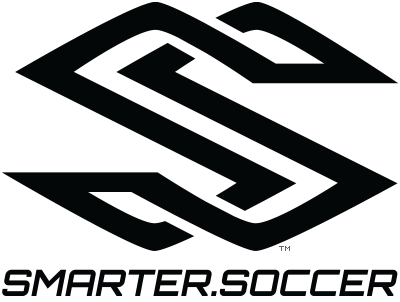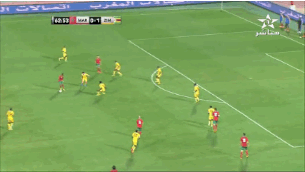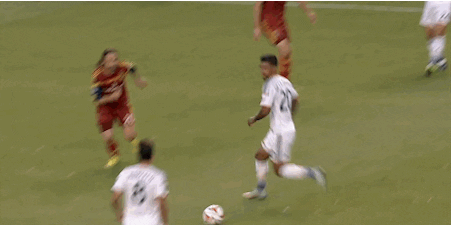SITUATIONAL AWARENESS
The very first Soccer Hacks blog post focused on the foundation of soccer game intelligence, awareness. For Season Two of Soccer Hacks, I want to focus on another type of awareness – situational awareness. They sound similar, but they’re actually quite different. First a quick review of awareness:
➤ Awareness begins by comprehending four things simultaneously:
- Where the ball is on the field
- Where your teammates are on the field
- Where the opponents are on the field
- Where you are on the field in relation to the above
You don’t gain awareness by just watching the ball, you gain awareness by constantly looking around and evaluating what’s happening on the field. This gives you an incredible “site picture” of what’s happening at any given moment. You can then use this intelligence to play smarter and faster, making the most out of any opportunity when the ball comes to you.
When your awareness becomes more developed, you’ll find that your on-field decisions become proactive, instead of reactive, meaning you’re ahead of the play, instead of always trying to catch up to what’s happening on the field. You’ll also start to recognize patterns of play. Things that happen repeatedly during the course of a game. The most obvious will be set plays, such as a corner kick or a goal kick, where your team or the opponents do the same thing over and over again, but you will also begin to identify these patterns during the course of regular play. This is Situational Awareness.
Recognizing these “situations” and being able to anticipate what will happen next gives you a distinctive advantage. You know what’s going to happen, before it happens. As an outside defender, this is the difference between getting easily dispatched by a one-two-pass from an overlapping attacker, or intercepting the ball. As an attacker, this is the difference between the defender going to ground to block your shot and you faking the shot, cutting back to your dominant foot and scoring the winning goal.
➤ Tendencies
The first step in gaining Situational Awareness will start with your own team. During your practice sessions and scrimmages you will begin to pick up the “tendencies” of your teammates. Does one of your Centerbacks tend to leave their position to man-mark the opponents Striker when he’s making a run into the box? If yes, then coverage will be needed for the space he vacated. How about your team’s Striker? Does he often dribble laterally as he approaches the opponents goal and end up on top of the Winger? Then the Winger needs to recognize this pattern and switch positions. Or if the Striker often over-dribbles and gets double-teamed by the opponents, maybe the best bet is for the Winger to drop back and offer support. Every player has their own habits and patterns that you should make every effort to learn. Once you innately recognize your teammates’ tendencies, you may hear your coach or others say your team has “chemistry” (see below).
➤ Always Be Observing
While you have plenty of opportunities to uncover how your teammates will most likely play in certain situations, you won’t have that luxury in games against opponents you’ve never played against. Therefore, you’ll have to detect these patterns as you’re playing. Smart soccer players make it their business to observe the opposing players they go up against over and over and learn: Which is their dominant foot? Do they like to take players on 1v1 or do they pass the ball? If they do like to dribble, do they have a skill move they use repeatedly to gain separation? Do they go to the sideline and use their speed or do they cut to the inside, looking to distribute? The more questions you can answer, the bigger advantage you’ll have in the game.
Let’s be honest, ask most youth soccer players these questions when they come off the field and you’ll get very few correct answers. Ask a smart soccer player these questions and you’ll get a detailed scouting report. Substitutes can certainly benefit from staying focused on the bench. Instead of talking about that last Math test, concentrate on the player you’re likely to go up against on the field. If you usually go in at Left Outside Midfield, observe the Right Outside Midfield on the other team, then the Right Outside Defender and so on. Then, when you go into the game, you’ll be able to use this intelligence to outplay your opponent.
➤ Gaining Situational Awareness Is Not Easy
Let’s be clear, gaining Situational Awareness isn’t easy. It takes a keen understanding of the game, the capacity to concentrate over long periods of time, and the ability to pick up subtle clues that will allow you to get ahead of the game to accurately predict outcomes. That said, smarter soccer players who do acquire this intelligence have an enormous advantage over their teammates and competitors.


Soccer Definition:
SITUATIONAL AWARENESS
➤ The ability to recognize Patterns Of Play.

EX.01
Chemistry
Understanding The Tendencies Of Your Teammates
You’ll often hear that certain teams or a group of players have “great chemistry.” This chemistry is simply that they understand the tendencies of their teammates and know in advance what they’re going to do in certain situations. Chemistry happens when all the players become innately aware of how their teammates play based on dedicated observation when they train. ★ Smarter.Soccer Insight: Don’t stop observing. Every moment you’re on the field, make sure you’re focused and observing your opponent. In fact, it’s just as important to observe your opponents when you’re on the bench, as it is when you’re playing. Want to take it to another level? Start observing the opponent when you arrive at the field and start warming up. Who has a good shot? Who’s fast? Whose technical skills stand out? It’s never too early to start acquiring the intelligence that can give you an edge.

Trackbacks/Pingbacks